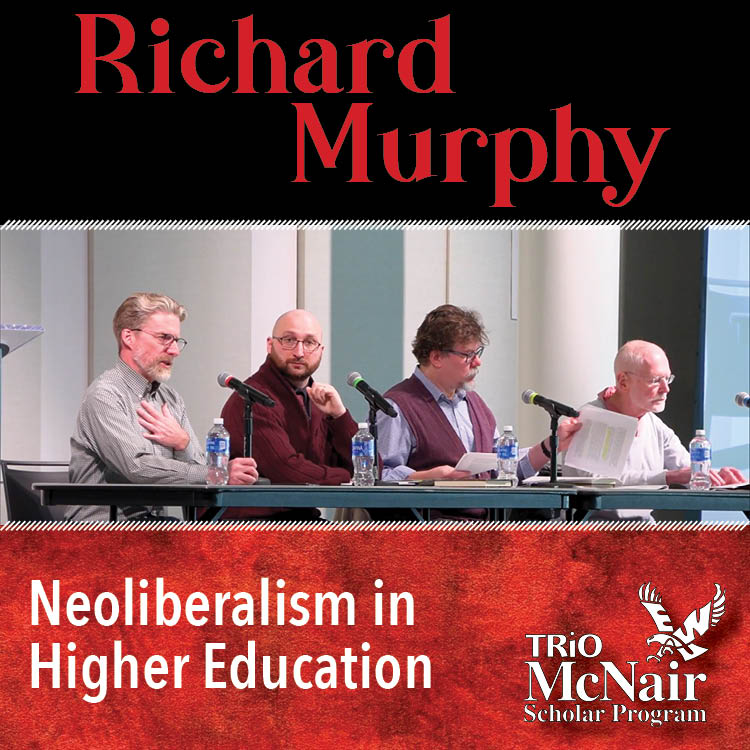 On February 9th in the Pence Student Union Building, EWU McNair scholar Richard Murphy participated on a panel on Neoliberalism in Higher Education. Richard is triple-majoring in Philosophy, Political Science, and International Affairs with an emphasis on Global Socio-Economic Development, and minoring in Spanish. For his 2022 Summer Research Internship, Richard worked with Dr. Thomas Hawley on a research project titled Neoliberalism’s Effect on Society: An Analysis of the Internalization of Neoliberalism on Freedoms and Democracy. The McNair staff are gratified to see Richard recognized for his work tackling this complicated topic which is essential to understanding the current state of higher education and its larger social impacts.
On February 9th in the Pence Student Union Building, EWU McNair scholar Richard Murphy participated on a panel on Neoliberalism in Higher Education. Richard is triple-majoring in Philosophy, Political Science, and International Affairs with an emphasis on Global Socio-Economic Development, and minoring in Spanish. For his 2022 Summer Research Internship, Richard worked with Dr. Thomas Hawley on a research project titled Neoliberalism’s Effect on Society: An Analysis of the Internalization of Neoliberalism on Freedoms and Democracy. The McNair staff are gratified to see Richard recognized for his work tackling this complicated topic which is essential to understanding the current state of higher education and its larger social impacts.
The panel was organized by the International Affairs Club, which includes McNair Scholars Richard Murphy and Badradin Mohammed and is overseen by long time McNair mentor Dr. Sharifi. Other panelists included EWU McNair Faculty Mentor Dr. Thomas Hawley, professor of Political Science, EWU McNair Faculty Mentor Dr. Kevin Decker, professor of Philosophy, and Dr. Timothy Kaufman-Osborn, professor of Politics and Leadership Emeritus at Whitman University.
The panel characterized neoliberalism as more than an economic policy and practice. It is a way of thinking and being that elevates economic values above all else, which has reconfigured education to focus on utility and return on investment. Under neoliberalism, citizens are considered entrepreneurs of themselves. An investment in education is the means to an end – gainful employment in the same field one studied – rather than part of an ongoing project of expansive learning, skill development, and sharing of knowledge. High tuition rates supposedly reflect students’ willingness and ability to invest in the self, but more so reflect diminishing investment at the state and federal levels. Neoliberalism encourages the conversion of social programs, including public education, to private business models. In practice, this often comes at the expense of the liberal arts, which provide skills needed to flourish in democracy.
Dr. Kaufman-Osborn presented a case study of Montana universities. Montana businesses and industries noted that Montana universities weren’t supplying enough graduates in the fields that the businesses wanted. In short, they were not generating employees for the employers. Montana government, business interests, and universities collaborated to design specific training to reproduce this labor force. Dr. Kaufman-Osborn dubbed this process “eduployment” and expressed concern that universities were becoming human capital training facilities. He raised the question:
Can an institution still be considered a public university if its offerings are dictated by private business interests?
Under this model, the needs and costs of businesses to train employees are outsourced to students and taxpayers. All of the panel participants called for distinguishing between job training and education, which many connected to concerns or questions related to EWU’s current Strategic Resource Allocation Process.
Several EWU McNair Scholars were in attendance. Here are some of their thoughts about the success of the panel, and what they took away:
The presentation was outstanding, and the panelist’s explanation of neoliberalism and its impact on education was exceptionally well done. I found it to be very informative, and I’m sure others did too.
Richard described the concept of “homo-economicus”, wherein a human becomes the means of production and consumption for itself, disregarding community and creating competition and cost-benefit analyses in completely inappropriate aspects of life, such as at home and between family and friends. The self awareness he exemplified when expressing why he feels he must have three undergraduate degrees and why he dressed the way he did for this panel was, in a word, commendable.
Colleges and universities are ranked by graduates entering the job market, rather than other indicators of success. The result is lower enrollment at schools which focus on other aspects of education besides job training. It’s worrisome how the burden of the university’s financial shortcomings falls on the students, with harmful impacts to academic integrity.

